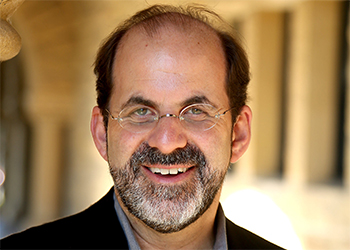Frederic O. Glover Professor in Humanities and Social Sciences
Professor of Communication
Professor of Political Science
krosnick@stanford.edu
650.725.3031
McClatchy Hall, Rm. 432
Krosnick does research on attitude formation, change, and effects, on the psychology of political behavior, and on survey research methods.
Winner of the American Association for Public Opinion Research’s Lifetime Achievement Award, Jon Krosnick is a social psychologist who does research on attitude formation, change, and effects, on the psychology of political behavior, and on survey research methods. He is the Frederic O. Glover Professor in Humanities and Social Sciences, Professor of Communication, Political Science, and (by courtesy) Psychology. At Stanford, in addition to his professorships, he directs the Political Psychology Research Group.
To read reports on Professor Krosnick’s research program exploring public opinion on the environment visit his the Public Opinion on Climate Change website.
Research Interests
Author of seven books and more than 190 articles and chapters, Dr. Krosnick conducts research in three primary areas: (1) attitude formation, change, and effects, (2) the psychology of political behavior, and (3) the optimal design of questionnaires used for laboratory experiments and surveys, and survey research methodology more generally.
His attitude research has focused primarily on the notion of attitude strength, seeking to differentiate attitudes that are firmly crystallized and powerfully influential of thinking and action from attitudes that are flexible and inconsequential. Many of his studies in this area have focused on the amount of personal importance that an individual chooses to attach to an attitude. Dr. Krosnick’s studies have illuminated the origins of attitude importance (e.g., material self-interest and values) and the cognitive and behavioral consequences of importance in regulating attitude impact and attitude change processes.
Among the topics explored by Dr. Krosnick’s political psychology research are: how policy debates affect voters’ candidate preferences, how the news media shape which national problems citizens think are most important for the nation and shape how citizens evaluate the President’s job performance, how becoming very knowledgeable about and emotionally invested in a government policy issue (such as abortion or gun control) affects people’s political thinking and participation, how people’s political views change as they move through the life-cycle from early adulthood to old age, and how the order of candidates’ names on the ballot affect voting behavior.
For almost 20 years, Professor Krosnick has been conducting survey research on the American public’s views of global warming. Many of his papers and public presentations on the topic can be seen on his Public Opinion on Climate Change website.
His questionnaire design work has illuminated the cognitive and social processes that unfold between researcher and respondent when the latter are asked to answer questions, and his on-going review of 100 years worth of scholarly research on the topic has yielded a set of guidelines for the optimal design of questionnaires to maximize reliability and validity. His recent work in survey methodology has explored the impact of mode of data collection (e.g., face-to-face, telephone, Internet) on response accuracy and the impact of survey response rates on substantive results.
Honors
Dr. Krosnick’s scholarship has been recognized by the AAPOR Award (the American Association for Public Opinion Research’s Lifetime Achievement Award), election as a fellow by the American Academy of Arts and Sciences and by the American Association for the Advancement of Science, the Erik Erikson Early Career Award for Excellence and Creativity in the Field of Political Psychology from the International Society of Political Psychology, a fellowship at the Center for Advanced Study in the Behavioral Sciences, the Phillip Brickman Memorial Prize for Research in Social Psychology, the American Political Science Association’s Best Paper Award, the American Association for Public Opinion Research Student Paper Award, the Midwest Political Science Association’s Pi Sigma Alpha Award, and the University of Wisconsin’s Brittingham Visiting Scholar Position.
Personal Life
In his spare time, Dr. Krosnick has fun with his wife, Stanford Professor Catherine Heaney, and their daughter, Alexandra, a Stanford graduate and and a postdoc at the University of California Berkeley School of Public Health. He also plays drums with a contemporary jazz group called Charged Particles that has released two CD’s internationally and tours across the U.S. and abroad.
Click on the following to view current projects, research team members, and a list of publications:

